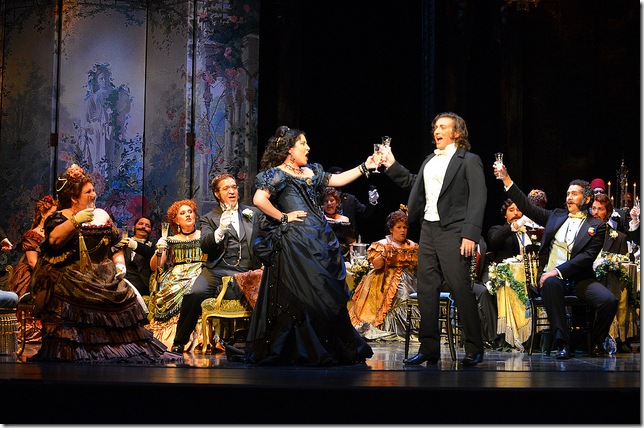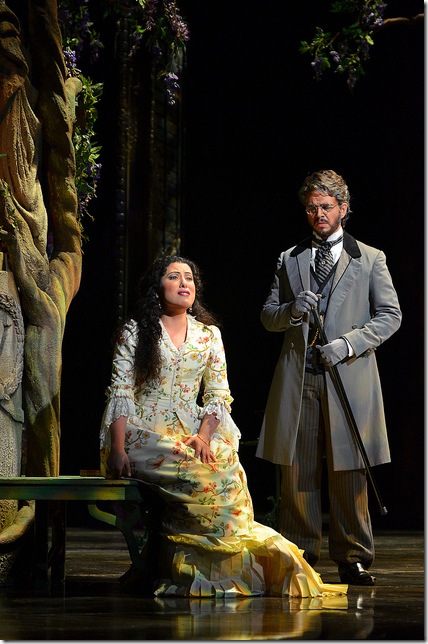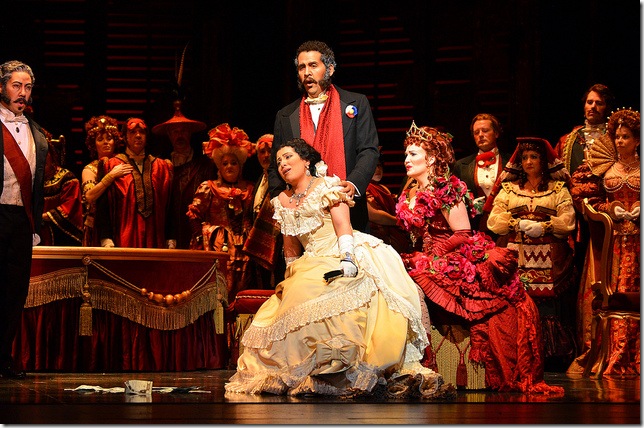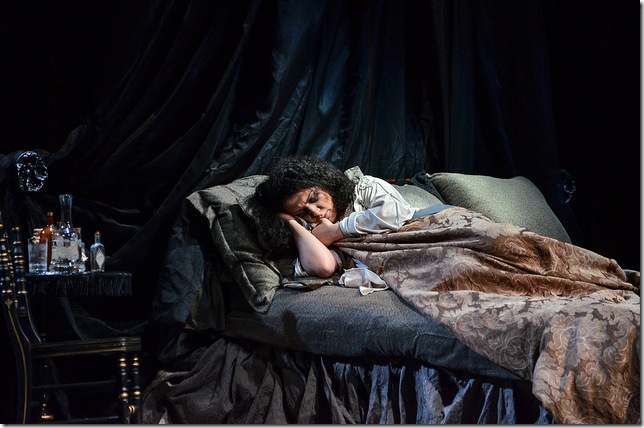South Florida has been a good place for the Mexican soprano Maria Alejandres.
She has sung Lucia for Palm Beach Opera, Manuel de Falla for the Palm Beach Symphony, and Juliette for Florida Grand Opera, and Saturday night she returned to FGO as the best-loved of Giuseppe Verdi’s heroines, Violetta Valery, the doomed courtesan of La Traviata.
She was joined by a very fine supporting cast, including an excellent Alfredo, for one of the best-sung Traviatas I’ve heard in some time. Marketers always go with Violetta’s tragedy to lure people to the opera house, but having good singers in all the roles with substantial stage time shows just how rich this opera really is musically; it reaches its peak not in the standout moments themselves, but when those moments emerge from a fully realized vocal and instrumental sound world, tinta and all.
This fine singing all took place against as traditional a Louis-Philippe backdrop as you could wish, carefully designed by Allen Charles Klein for this Cincinnati Opera-FGO co-production, and skillfully directed by Bliss Hebert. This is a straightforward, uncontroversial mounting of the opera, and given the high level of musicality here, that is just as well.
In Alejandres, FGO has a Violetta with a big, youthful voice whose strength and power last all the way to the final bars. With that force comes a certain weight; the Sempre libera that closes Act I was large and impressive, but not insouciant. It sounded determined rather than wickedly willful, an effect that would be easier to get with a lighter instrument.
Alejandres is a capable actress as well, remembering to sing as though she were consumptive, adding stage gulps for air that nicely reminded us of Violetta’s nearness to the grave. Some of Alejandres’ top notes (the E-flat in Sempre libera most notably) were somewhat shrill, but they were never weak. She husbanded her voice on opening night at the Ziff Ballet Opera House, pulling back on some phrase endings and not singing the two climactic all-voices-on-deck descending passage (Ah, t’amero!) that closes the concertato of Act II. If she was feeling a touch vocally insecure, it was a wise move. Her Violetta was compassionate, interesting and musically adept.
The Italian tenor Ivan Magri, replacing fellow Italian Paolo Fanale, was a most effective Alfredo. This is a somewhat thankless role, but it was evident early on that Magri made a fine Alfredo vocally, not just because he could sing the notes with zest and muscle, but because he could sing them with warmth. The celebrated Libiamo, for example, is a cue for a lot of tenors to sing brightly and youthfully, and it comes off stiff. Magri, on the other hand, sang it just as capably, but with an inviting ingratiating quality quite characteristic of an older generation of tenors, and it worked like a charm: This is, after all, an invitation to drink, and it needs to sound like one.
Magri’s voice is not huge, but it got bigger and fuller as the night went on, and he sounded lovely in duet with Alejandres; one gets the sense that his voice will continue to grow and develop, which made his debut with the company even more exciting. His acting was decent, but that also got better as the opera continued. It would have been good to see him enter with more charisma, like a man who knows he’s attractive to women and in demand at these hedonistic affairs in part because of that.
As Germont, another Italian newcomer, baritone Giorgio Caoduro, also made a strong impression. His voice is flexible and supple, not particularly large but attractive over its whole compass. His signature Act II aria, Di Provenza il mar il suol, was gentle and hearfelt, perhaps more tender than the usual Germont, and more appealing thereby. He was also effective in seeming to not know how to react when Violetta asks to be embraced like a daughter. This made his vow to do just that in Act III more persuasive.
In the minor roles, Lacy Sauter was a light-but-agile-voiced Flora, carrying the concertato’s top when Alejandres rested and tackling her small but sometimes florid musical role ably. As Annina, mezzo Carla Jablonski offered up a strong, dark voice that had real character and made her interaction with the dying Violetta memorable.
As Dr. Grenvil, the always reliable Graham Fandrei was sober and smooth-voiced, and Ryan Milstead, who has been heard in larger roles at FGO, brought a big, pleasant sound to his short stay on the boards. Adam Lau, whose large, sonorous instrument has been a pleasure to hear in FGO’s La Bohème and Die Zauberflöte earlier this season, was an effective Baron Douphol, and while tenor Matthew Maness’s Gastone was decently sung, his affected mannerisms as the initial master of the revels were somewhat overdone.
Rosa Mercedes’ dancers in Act II were attractive and graceful, and they managed to seem like an integral part of the party rather than a random one. Klein’s costumes were excellent (Violetta’s summery dress in Act II was a good reflection of her happy mood) overall, and hilarious in the case of the men’s entrance in Scene 2 of that act (gotta love that guy with the miter); Christopher Diamantides’ hair and makeup work surely helped. Thomas Hase’s lighting was everything it needed to be, with an almost too-hot brightness at Flora’s party that underlined the contrast between the cool sylvan greens of the garden in the scene before.
Ramon Tebar brought his usual drive and forcefulness to this splendid score, and the FGO orchestra played it beautifully. Only the offstage band for the revelers going by Violetta’s apartment in Act III was not up that standard; in attempting to sound authentic, it sounded clumsy. Michael Sakir’s chorus was quite good, with the precision of their mass questions (an old-fashioned device when Verdi composed the opera) helping to keep those moments from eliciting snickers.
Although the principals are more than enough reason to attend this version of Traviata, it is the high quality of the ensemble work – the duets (Violetta and Alfredo, Violetta and Germont), the quintet in Act III, the Act II ending – that make it so satisfying. If we as audience members care only about the fate of Violetta in general, at least we can do that in a context where the other voices in her drama are distinctly heard.
Casting so many able singers lets us really hear all the music Verdi wrote, and in this bicentenary year of his birth, that should be one of the top priorities for all opera companies who take him on.
La Traviata can be seen again with this cast on Tuesday and Friday at the Ziff Ballet Opera House in Miami, and May 2 and 5 at the Broward Center for the Performing Arts in Fort Lauderdale. Suzanne Vinnik is Violetta, John Bellemer is Alfredo, and Joo Won Kang is Germont on Wednesday and Saturday at the Ziff Ballet Opera House, and May 4 in Fort Lauderdale. For tickets or more information, call 800-741-1010 or visit www.fgo.org.



